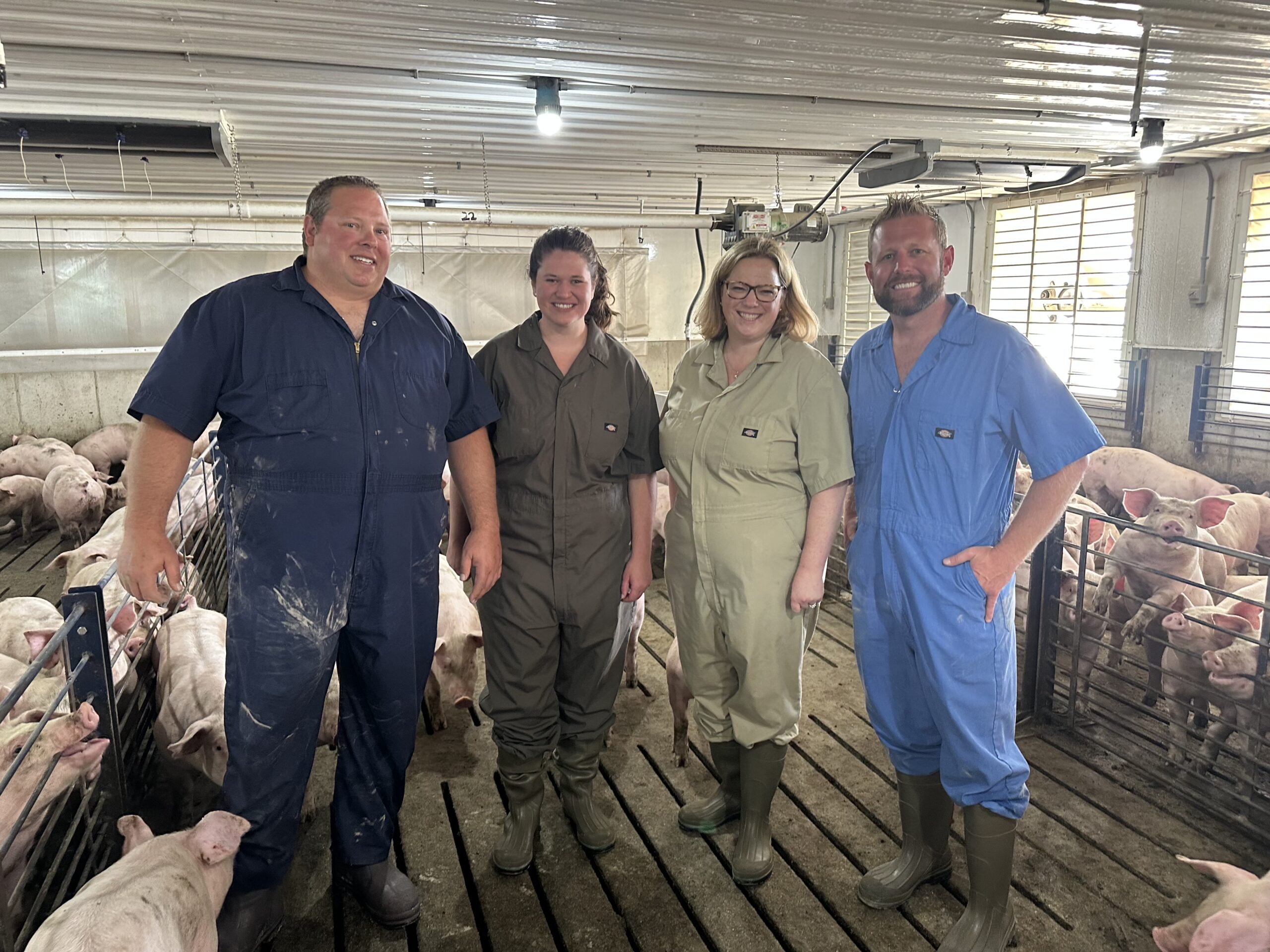Capital Update – For the Week Ending July 21, 2023
In this week’s National Pork Producers Council (NPPC) Friday recap: USDA Under Secretary visits Minnesota sow farm, United Kingdom to join CPTPP, USTR’s Tai in Kenya, congressional resolution supports checkoff programs and senators introduce bill to exempt farm emission reporting. Take a deeper dive below.
Capital Update to Modify Schedule as Congress Takes Break
Capital Update will be issued on an as-needed basis during the Congressional August recess. It will resume regular publication on Friday, September 8.
Under Secretary Jenny Lester Moffitt Visits Sow Farm in Minnesota
What happened: On Tuesday, July 19, NPPC and Minnesota Pork Producers Association leadership hosted Under Secretary for Marketing and Regulatory Programs at the United States Department of Agriculture (USDA), Jenny Lester Moffitt, and Deputy Under Secretary for Marketing and Regulatory Programs at USDA, Katie Zenk, for a tour of a Mankato, Minnesota sow farm.
Minnesota Pork also hosted a roundtable luncheon with the group and state producers. Discussions ranged from animal health priorities in the 2023 Farm Bill to foreign animal disease (FAD) prevention and preparedness and challenges facing the industry.

From left to right: Contract grower for Schwartz Family Farms, Corey Hoppe, Deputy Under Secretary for Marketing and Regulatory Programs at USDA, Katie Zenk, Under Secretary for Marketing and Regulatory Programs at USDA, Jenny Lester Moffitt, and Tim Schwartz of Schwartz Family Farms.
From left to right: Deputy Under Secretary for Marketing and Regulatory Programs at USDA, Katie Zenk, Minnesota Pork Chief Executive Officer, Jill Resler, Under Secretary for Marketing and Regulatory Programs at USDA, Jenny Lester Moffitt, NPPC President-Elect, Lori Stevermer, and NPPC Vice President of Domestic Policy, Kelly Cushman.

United Kingdom to Join CPTPP
What happened: The United Kingdom (UK) is joining the 11-member Comprehensive and Progressive Agreement for Trans-Pacific Partnership (CPTPP), the Pacific Rim trade bloc launched in early 2018 after the United States withdrew from its predecessor pact, the Trans-Pacific Partnership (TPP).
After almost two years of negotiations, the UK last Sunday signed a formal agreement to become a member of the CPTPP. It is expected to officially enter the free trade pact sometime next year. The UK had been part of the 27-member European Union for over 47 years but left the economic common market in early 2020.
Why it matters: Once it accedes to the CPTPP, the UK will join Australia, Brunei, Canada, Chile, Japan, Malaysia, Mexico, New Zealand, Peru, Singapore and Vietnam to become the world’s third-largest trade pact. The bloc will have a combined $15.7 trillion, or 15%, of the globe’s GDP. About 99% of UK exports to CPTPP countries, with a combined 500 million consumers, will be tariff-free.
NPPC’s take: NPPC, a strong proponent of the TPP, has urged the past two administrations to join the CPTPP and pursue other ambitious agreements. NPPC wants trade deals to address agricultural market access, including eliminating tariff and non-tariff barriers to U.S. pork and requiring adopting science-based technical, sanitary, and phytosanitary standards.
USTR’s Tai in Kenya to Assess Trade Talks
What happened: U.S. Trade Representative Katherine Tai traveled to Kenya this week to assess talks on the U.S.-Kenya Strategic Trade and Investment Partnership (STIP). She also was scheduled to meet with Kenyan President William Ruto. Launched a year ago. The initiative aims to “increase investment; promote sustainable and inclusive economic growth; benefit workers, consumers, and businesses; and support African regional economic integration.” Among other areas, the STIP covers agriculture; it does not address tariffs.
The goals of the United States in negotiations on agriculture are to increase transparency and regulatory certainty for exporters and importers; establish science-based decision-making to protect human, plant, and animal life and health; improve processes and promote cooperation on regulatory and administrative requirements; and facilitate agricultural trade, with provisions related to import licensing, certification requirements, and equivalency to ensure that import requirements are clearly communicated to agricultural producers.
What it means for producers: With a population of about 50 million, an expanding middle class, and relatively strong tourism-driven demand from its hotel, restaurant, and institutional food service sectors, Kenya has the potential to be a significant export market for U.S. pork products. Currently, though, it has tariff and non-tariff barriers that limit U.S. pork imports.
NPPC’s position: NPPC supports the talks between the United States and Kenya and hopes negotiations will further open the African nation’s market to U.S. pork. In comments submitted to USTR last year following the announcement of the STIP, NPPC urged U.S. trade negotiators to push Kenya to eliminate its unjustified restrictions on U.S. pork imports. Those include onerous testing and inspection requirements, non-science-based sanitary and phytosanitary barriers, and failure to recognize the equivalence of U.S. pork production practices and the U.S. food safety inspection and approval system for pork slaughter, processing, and storage plants.
Congressional Resolution Supports Checkoff Programs
What happened: Rep. Barry Moore (R-AL) has introduced a resolution in support of the federal commodity checkoff programs, which are funded through contributions from farmers and used to promote and conduct research on various agricultural products, including pork.
There are 22 checkoff programs – three are not agriculture-related – overseen by the U.S. Department of Agriculture, with each administered by a board that designates funds for promotion and research programs. USDA must approve such expenditures.
Moore’s bipartisan resolution, which has 23 cosponsors, is a response to the “Opportunities for Fairness in Farming (OFF) Act,” which, among other things, would prohibit checkoff programs from contracting with any entity that has an interest before the federal government. Research organizations and land-grant universities generally have such interests. The legislation was introduced earlier this year in the Senate by Cory Booker (D-NJ), Elizabeth Warren (D-MA), Mike Lee (R-UT), and Rand Paul (R-KY) and in the House by Nancy Mace (R-SC) and Dina Titus (D-NV).
Why it matters: Checkoff programs help expand markets, increase demand, and develop new uses for commodities. According to USDA, for every $1 paid into a checkoff, as much as $18 is returned to farmers. A 2021 study by Cornell University economist Henry Kaiser found the Pork Checkoff program returned $27.57 for each $1 paid into it.
NPPC’s take: NPPC supports the federal commodity checkoff programs, including the Pork Promotion, Research, and Consumer Information Act of 1985. In addition to promoting U.S. pork domestically and internationally and funding research on production, processing, human nutrition, animal well-being, and environmental protection, the pork checkoff administered by the National Pork Board conducts producer and consumer education.
Senators Introduce Bill to Exempt Farm Emission Reporting
What happened: On Thursday, Senator Deb Fischer (R-NE), along with 16 additional Senate Co-Sponsors, introduced a bill (S. 2430) to amend the Emergency Planning and Community Right to Know Act to exclude reporting of routine emissions from livestock farms to state and local emergency response authorities.
Why it matters: Pork producers and other livestock industries have engaged with federal and state regulators for decades over permitting and reporting of air emissions. This engagement has included both the air consent agreements that many producers signed, exempting them from having to file emergency reports to first responders. In addition, pork and other livestock farmers, have close working relationships with their local fire departments and first responders. In fact, in many areas, the members of those fire departments are the local livestock farmers.
In 2018, in response to lawsuits filed by animal rights extremists, Congress permanently exempted livestock farmers from having to report emissions under the Superfund law to the US Coast Guard’s National Response Center. At the same time, EPA exempted those same farms from making similar reports to state and local first responders. Following further litigation by animal rights extremists seeking to undermine the joint efforts of Congress and EPA, the Biden Administration agreed to re-open that rulemaking to reconsider the exemption from the emergency release reporting requirement to local first responders. Senator Fischer’s bill would clarify that the 2018 Farms Act, and EPA’s prior regulations, were correct and that livestock farms should not be required to inundate local fire departments with reports on routine farm emissions.
NPPC’s take: NPPC strongly supports Congress’s passage of S. 2430.EPA’s forthcoming proposed rule is extremely burdensome for the pork producers who would be required to report routine emissions from their farms, the local fire departments, and other first responders who would be inundated by thousands of these filings, which have no value to them.